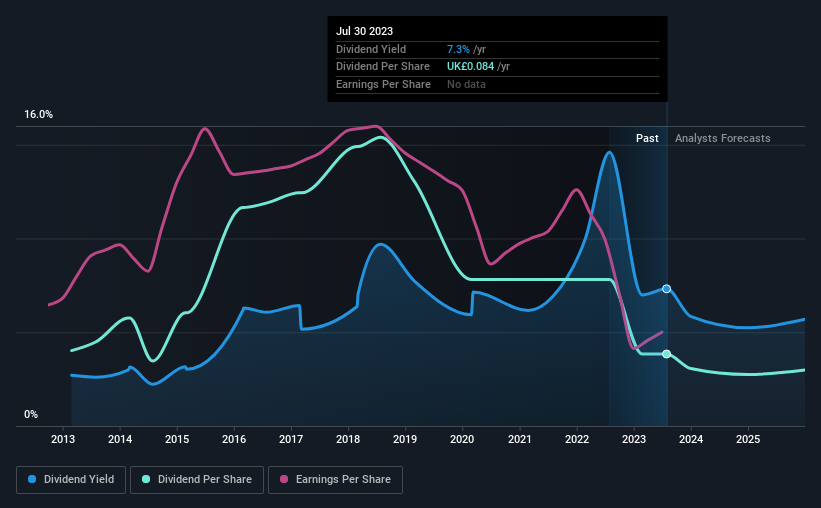- United Kingdom
- /
- Capital Markets
- /
- LSE:JUP
Only Three Days Left To Cash In On Jupiter Fund Management's (LON:JUP) Dividend

Readers hoping to buy Jupiter Fund Management Plc (LON:JUP) for its dividend will need to make their move shortly, as the stock is about to trade ex-dividend. Typically, the ex-dividend date is one business day before the record date which is the date on which a company determines the shareholders eligible to receive a dividend. The ex-dividend date is of consequence because whenever a stock is bought or sold, the trade takes at least two business day to settle. Thus, you can purchase Jupiter Fund Management's shares before the 3rd of August in order to receive the dividend, which the company will pay on the 1st of September.
The company's next dividend payment will be UK£0.064 per share, on the back of last year when the company paid a total of UK£0.084 to shareholders. Based on the last year's worth of payments, Jupiter Fund Management has a trailing yield of 7.3% on the current stock price of £1.148. Dividends are a major contributor to investment returns for long term holders, but only if the dividend continues to be paid. As a result, readers should always check whether Jupiter Fund Management has been able to grow its dividends, or if the dividend might be cut.
See our latest analysis for Jupiter Fund Management
Dividends are usually paid out of company profits, so if a company pays out more than it earned then its dividend is usually at greater risk of being cut. Fortunately Jupiter Fund Management's payout ratio is modest, at just 37% of profit.
When a company paid out less in dividends than it earned in profit, this generally suggests its dividend is affordable. The lower the % of its profit that it pays out, the greater the margin of safety for the dividend if the business enters a downturn.
Click here to see the company's payout ratio, plus analyst estimates of its future dividends.

Have Earnings And Dividends Been Growing?
When earnings decline, dividend companies become much harder to analyse and own safely. Investors love dividends, so if earnings fall and the dividend is reduced, expect a stock to be sold off heavily at the same time. Jupiter Fund Management's earnings per share have fallen at approximately 20% a year over the previous five years. When earnings per share fall, the maximum amount of dividends that can be paid also falls.
Another key way to measure a company's dividend prospects is by measuring its historical rate of dividend growth. Jupiter Fund Management's dividend payments are effectively flat on where they were 10 years ago. If a company's dividend stays flat while earnings are in decline, this is typically a sign that it is paying out a larger percentage of its earnings. This can become unsustainable if earnings fall far enough.
Final Takeaway
Is Jupiter Fund Management worth buying for its dividend? Jupiter Fund Management's earnings per share are down over the past five years, although it has the cushion of a low payout ratio, which would suggest a cut to the dividend is relatively unlikely. In sum this is a middling combination, and we find it hard to get excited about the company from a dividend perspective.
If you're not too concerned about Jupiter Fund Management's ability to pay dividends, you should still be mindful of some of the other risks that this business faces. Case in point: We've spotted 1 warning sign for Jupiter Fund Management you should be aware of.
If you're in the market for strong dividend payers, we recommend checking our selection of top dividend stocks.
New: Manage All Your Stock Portfolios in One Place
We've created the ultimate portfolio companion for stock investors, and it's free.
• Connect an unlimited number of Portfolios and see your total in one currency
• Be alerted to new Warning Signs or Risks via email or mobile
• Track the Fair Value of your stocks
Have feedback on this article? Concerned about the content? Get in touch with us directly. Alternatively, email editorial-team (at) simplywallst.com.
This article by Simply Wall St is general in nature. We provide commentary based on historical data and analyst forecasts only using an unbiased methodology and our articles are not intended to be financial advice. It does not constitute a recommendation to buy or sell any stock, and does not take account of your objectives, or your financial situation. We aim to bring you long-term focused analysis driven by fundamental data. Note that our analysis may not factor in the latest price-sensitive company announcements or qualitative material. Simply Wall St has no position in any stocks mentioned.
About LSE:JUP
Excellent balance sheet second-rate dividend payer.
Similar Companies
Market Insights
Community Narratives


